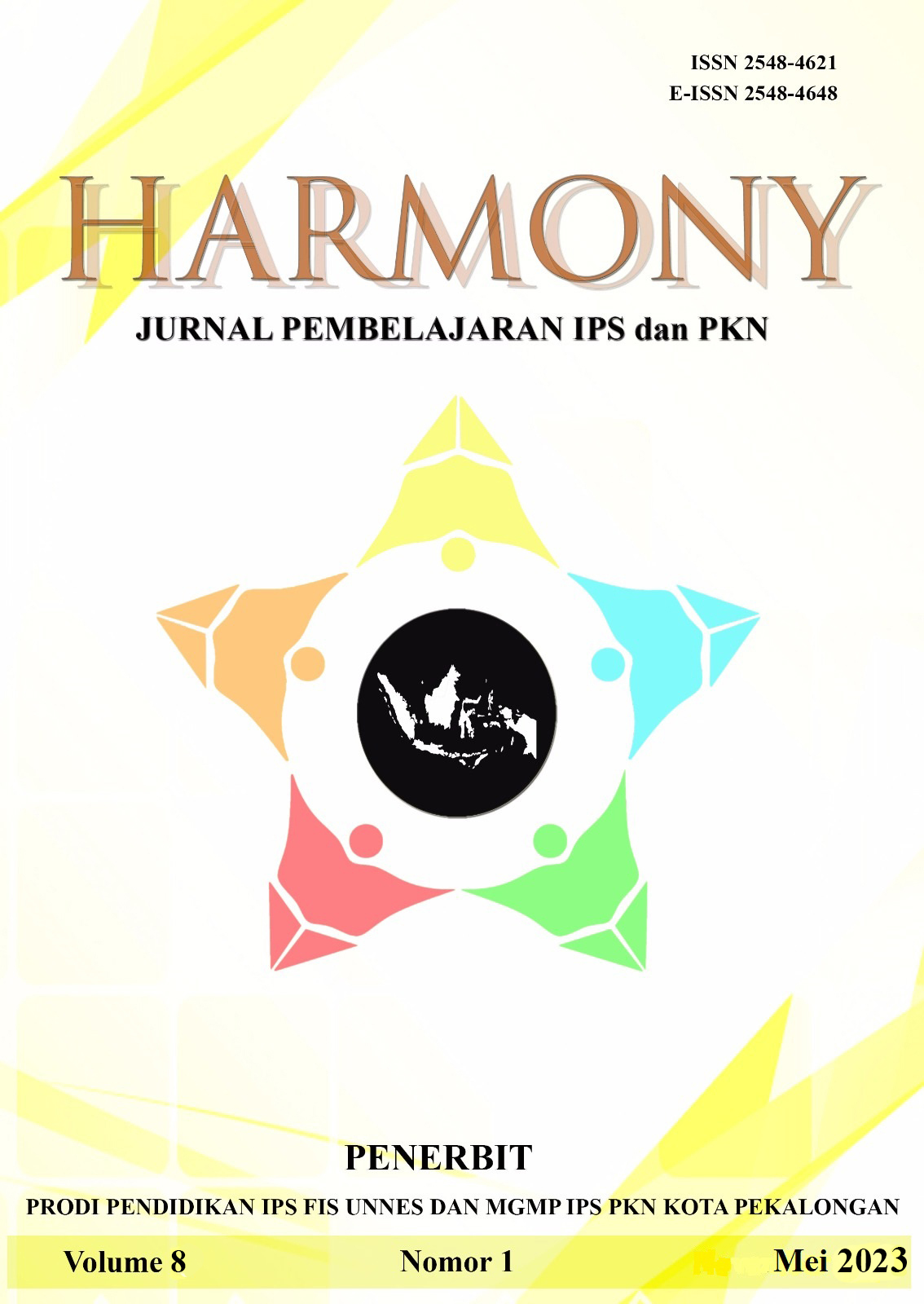IMPLEMENTASI PENDIDIKAN KEWARGANEGARAAN DALAM MEWUJUDKAN WARGA NEGARA BAIK DAN CERDAS
##plugins.themes.academic_pro.article.main##
Abstract
Penelitian ini bertujuan untuk mengetahui proses pembentukan warga negara yang baik (good citizen) melalui penyelenggaraan mata kuliah PKn yang sesuai dengan Pancasila dan UUD 1945. Kajian ini diharapkan mampu memberikan rumusan penyelenggaraan mata kuliah pendidikan kewarganegaraan yang ideal. Penelitian ini merupakan penelitian kualitatif, dan fokusnya adalah memperdalam pemahaman manajemen pendidikan kewarganegaraan dalam proses pencapaian warga negara yang baik dan cerdas (smart and good citizens) yang. Hasil penelitian menunjukkan bahwa PKn merupakan ilmu yang perlu dipelajari untuk membentuk warga negara yang baik, cerdas, ideal, berbakat yang berdasarkan ideologi Pancasila. Pendidikan kewarganegaraan memiliki tujuan membentuk warga negara yang baik yang meliputi tiga aspek yaitu civics knowledge, civics skills, civics disposition. Upaya pembentukan warga negara yang baik dan cerdas melalui pendidikan kewarganegaraan dapat dilakukan dengan memberikan pemahaman terhadap pengetahuan yang menekankan pembentukan sikap kejujuran, integritas, disiplin, dan kerja keras guna menjadi bangsa yang berkarakter dan berdaya saing.
This research aims to determine the process of forming a good citizen through the implementation of civics courses in accordance with Pancasila and the UUD NRI 1945. This study is expected to be able to provide a formulation for the implementation of an ideal civic education course. This research is a qualitative research, and the focus is to deepen the understanding of civic education management in the process of achieving smart and good citizens. The results showed that Civics is a science that needs to be studied to form good, smart, ideal, talented citizens based on the Pancasila ideology. Citizenship education has the goal of forming good citizens which includes three aspects, namely civics knowledge, civics skills, civics disposition. Efforts to form good and smart citizens through civic education can be carried out by providing an understanding of knowledge that emphasizes the formation of honesty, integrity, discipline and hard work in order to become a nation with character and competitiveness.
##plugins.themes.academic_pro.article.details##
References
Barbara M. Wildemuth. 2009. Applications of Social Research Methods to Questions in Information and Library Science. Handbook of Pragmatics, 1–16. https://doi.org/10.1075/hop.11.thi1
Chotimah, U. 2017. Revitalizing the Role of Pancasila and Civics Education as Part of Nationality Development and Character Building in Indonesia. 225–229. https://doi.org/10.2991/ice-17.2018.50
Dikdik Baehaqi Arif, D. 2014. Pendidikan Kewarganegaraan dan Pembentukan Karakter Demokratis Warga Negara.
Doppen, F. H. 2007. Now what? Rethinking civic education in the Netherlands. Education, Citizenship and Social Justice, 2(2), 103–118. https://doi.org/10.1177/1746197907077043
Farisi, M. 2015. Pendidikan Ips Sebagai “Synthetic Discipline”: Kajian Epistemologis Atas Pemikiran Nu’man Somantri. 128–139.
Gustilianto, G. 2017. Revitalisasi Nilai-nilai Pancasila melalui Pembelajaran Pendidikan Pancasila dan Kewarganegaraan dalam Upaya Membangun Warga Negara yang Baik.
Ihsan. 2017. Kecenderungan Global Dalam Proses Pembelajaran Pendidikan Pancasila Dan Kewarganegaraan Di Sekolah. Jurnal Pancasila Dan Kewarganegaraan, 2(2), 49–58. https://doi.org/10.24269/v2.n2.2017.49-58
Kalekin-Fishman, D. 2001. Review: David Silverman 2001. Interpreting Qualitative Data: Methods for Analysing Talk, Text and Interaction. Forum Qualitative Sozialforschung / Forum: Qualitative Social Research, 2(3). https://doi.org/10.17169/fqs-2.3.923
Margaret S. Branson, D. 1999. Seri Pendidikan Politik Belajar’Givic Education’ dari Amerika (Issue November).
Mcginnis, T. A. 2015. “A Good Citizen is What You’ll Be”: Educating Khmer Youth for Citizenship in a United States Migrant Education Program. Journal of Social Science Education ©JSSE, 14(3), 66–74. https://doi.org/10.2390/jsse-v14-i3-1399
Mulyono, B. 2017. Reorientasi civic disposition dalam kurikulum Pendidikan Kewarganegaraan sebagai upaya membentuk warga negara yang ideal. In Jurnal Civics (Vol. 14).
Oluniyi, O. 2011. Country Report: Citizenship Education and Curriculum Development in Nigeria. Journal of Social Science Education © JSSE, 10, 61–67. https://www.jsse.org/index.php/jsse/article/view/578
Oonk, H. 2014. The european cooperation is facing new challenges - Some impact on citizenship education in the Netherlands. Journal of Social Science Education, 13(3), 73–82. https://doi.org/10.2390/jsse-v13-i3-1311
Pinet, R. 2006. The Contestation of Citizenship Education at Three Stages of the LINC 4 & 5 Curriculum Guidelines: Production, Reception, and Implementation. TESL Canada Journal, 24(1), 1. https://doi.org/10.18806/tesl.v24i1.25
Pinson, H. 2007. At the boundaries of citizenship: Palestinian Israeli citizens and the civic education curriculum. Oxford Review of Education, 33(3), 331–348. https://doi.org/10.1080/03054980701366256
Sumardjoko, B. 2013. Revitalisasi Nilai-Nilai Pancasila Melalui Pembelajaran PKN Berbasis Kearifan Lokal untuk Penguatan Karakter dan Jati Diri Bangsa. lppmums. http://publikasiilmiah.ums.ac.id/handle/11617/4291
Suyato, S., Murdiono, M., Mulyono, B., & Arpannudin, I. 2016. Upaya pembentukan warga negara yang baik dan tantangan yang dihadapi oleh para guru PKn peserta SM3T 2015. Jurnal Civics: Media Kajian Kewarganegaraan, 13(2), 137–150. https://doi.org/10.21831/civics.v13i2.12737
Westheimer, J., & Kahne, J. 2004. What kind of citizen? The politics of educating for democracy. American Educational Research Journal, 41(2), 237–269. https://doi.org/10.3102/00028312041002237
Winataputra, U. S. 2014. Diskursus Aktual Tentang Paradigma Pendidikan Kewarganegaraan (Pkn) Dalam Konteks Kurikulum 2013.
